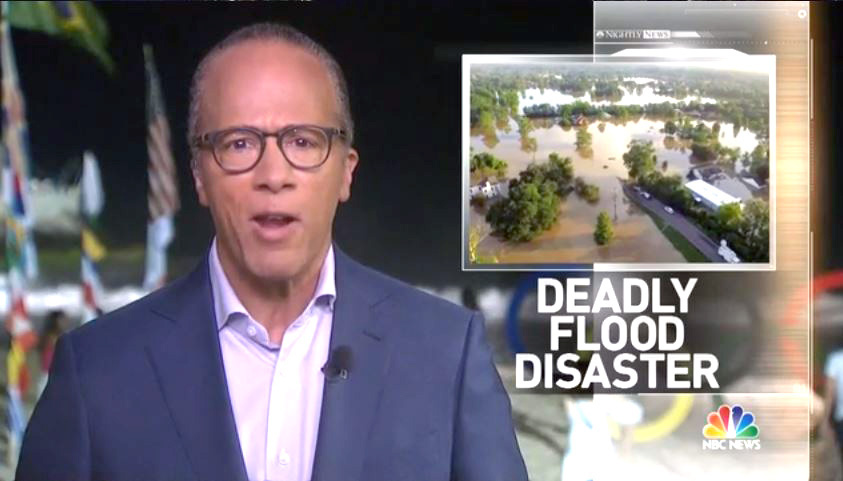
Louisiana Flood ‘Worst Natural Disaster’ Since Hurricane Sandy, Red Cross Says

By Kevin Kalhoefer
The major U.S. broadcast news networks have all ignored climate change in their nightly news coverage of Louisiana’s recent record-breaking rainfall and flooding. The New York Times and The Washington Post, by contrast, have explained how the extreme weather and flooding in Louisiana are in line with the predicted impacts of a warming planet.
The disaster in Louisiana killed at least 11 people and displaced thousands more. The American Red Cross described the state’s flooding as “the worst natural disaster to strike the United States since Superstorm Sandy” and the National Oceanic and Atmospheric Association classified the record rainfall as a once-in-every-500-years event—the eighth such event to take place in the U.S. since May 2015.
Climate Nexus’ Climate Signals, a tool designed to “[e]xplore how climate change affects your world by searching events, impacts and related climate signals,” explained how Louisiana’s increased atmospheric moisture and unusually heavy rainfall were “classic signals of climate change”:
At least nine people have died in what the American Red Cross is calling the “worst disaster since Superstorm Sandy.” On Aug. 11, a measure of atmospheric moisture, precipitable water, was in historic territory at 2.78 inches, a measurement higher than during some past hurricanes in the region. Increased moisture in the air and unusually heavy rainfall are classic signals of climate change. As the world warms, storms are able to feed on warmer ocean waters and the air is able to hold and dump more water. These trends have led to a pronounced increase in intense rainfall events and an increase in flooding risk. In the Southeastern U.S., extreme precipitation has increased 27 percent from 1958 to 2012.
[…]
The storm in the Southeastern U.S. was supercharged by running over a warmer ocean and through an atmosphere made wetter by global warming.
Climate change is now responsible for 17 percent of moderate extreme rainfall events, i.e. one-in-a-thousand day events. The more extreme the event, the more likely climate change was responsible, as climate change affects the frequency of the extreme events the most.
However, the major broadcast networks’ nightly newscasts have ignored climate change in their otherwise extensive coverage of the floods. NBC Nightly News aired five segments on the floods without mentioning climate change, while ABC’s World News Tonight and CBS Evening News each aired three such segments and PBS NewsHour aired two.
By contrast, two major newspapers have noted how Louisiana’s deadly floods are in line with expectations for a warming planet. In an Aug. 15 Washington Post article, Chris Mooney wrote that climate researchers were affirming that the heavy rainfall Louisiana experienced is “precisely the sort of event that you’d expect to see more of on a warming planet” and quoted climate researcher Katharine Hayhoe explaining, “Louisiana is always at risk of floods, naturally, but climate change is exacerbating that risk, weighting the dice against us.”
Moreover, an Aug. 16 article in The New York Times quoted Texas’ state climatologist stating, “There’s definitely an increase in heavy rainfall due to climate change.” And another Aug. 16 Times article—headlined Flooding in the South Looks a Lot Like Climate Change—quoted David Easterling, a director at the National Centers for Environmental Information, stating that Louisiana’s heavy rainfall and flooding “is consistent with what we expect to see in the future if you look at climate models.”
Media Matters’ annual study of how the major networks cover climate change found that PBS, CBS and NBC frequently addressed the link between climate change and extreme weather in their nightly newscasts in 2015. However, the broadcast networks appear to have regressed in their extreme weather coverage this year, with every major TV network ignoring the role of human-induced climate change in their coverage of Texas’ record rainfall and flooding throughout April and May, despite both NBC Nightly News and CBS Evening News explaining the climate connection in their coverage of similarly drastic Texas floods the year before. The nightly newscasts’ omission of climate change in their coverage of Louisiana’s horrific flooding marks a continuation of that discouraging trend.
UPDATE (8/18/16): After this piece was published, PBS NewsHour aired an Aug. 17 segment with Louisiana state climatologist Barry Keim and Columbia University professor Adam Sobel that discussed how the Louisiana flooding and Blue Cut wildfire in California are “related to climate change.”

 233k
233k  41k
41k  Subscribe
Subscribe 
